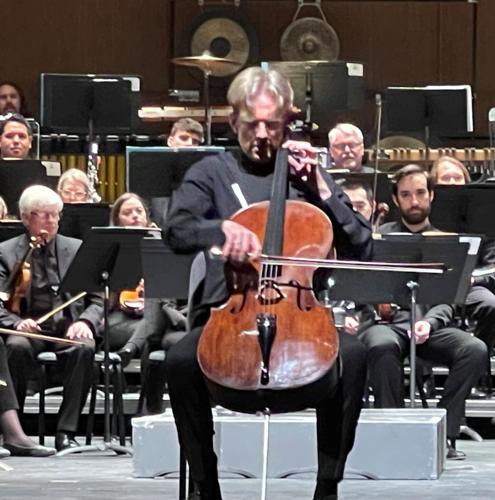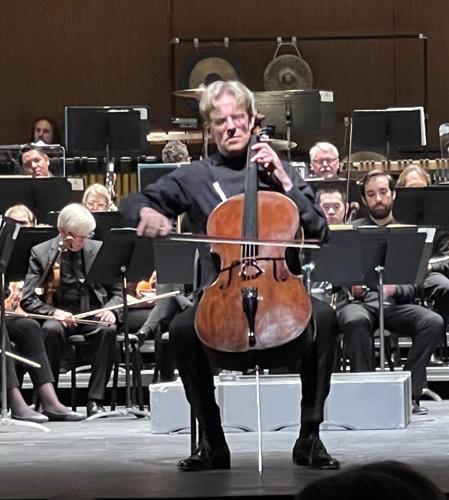Once the applause died down at Linda Ronstadt Music Hall on Friday night, German-Canadian cellist pulled a chair to the front of the stage and played an excerpt from a Bach cello suite.

German-Canadian cellist Johannes Moser made his УлшжжБВЅ Symphony Orchestra debut on Friday, performing Dutilleuxтs Concerto for Cello and Orchestra.
After the 30-minute workout of French composer Henri Dutilleuxтs тTout un monde lointainт (A whole distant world), Moser said he could use a little light fare.
He wasnтt the only one.
The audience barely making a dent in the 2,300-seat Linda Ronstadt Music Hall on Friday, Oct. 20, needed to take a deep breath with him.
тTout un monde lointain,т by the composerтs design, is a beast for the cello soloist, requiring mood changes from somber and dour to downright feisty bordering on aggressive.
Add in a blast of brass and screaming violins plucked and strummed with the frenetic energy of preschoolers hyped up on Halloween candy and you can imagine what was coming through our ears.
People are also reading…
Dissonant rumbling, rattling and scratching from the percussions, fits of fury from the strings and melodic discord emanating from the winds and brass.
If your idea of classical music revolves around the meat and potatoes of Bach, Beethoven and Mozart, you probably were massaging your ears to allow Dutilleuxтs square notes into your round lobes. But that seems like part of TSO Music Director JosУЉ Luis Gomezтs point in programming the concerto, which until Friday night had never been performed by the orchestra.
But there was more to like than dislike about the piece. In the fourth movement, after the disharmony and drama of the crashing and banging third movement, we hear the peaceful quiet of a harp that seems to calm the celloтs jitters. Every time Moser would amp up the edginess, youтd hear that soothing reassurance of the harp.
Of course, all bets were off in the fiery finale. Melodies materialized only to be quashed in feverish agitation from Concertmaster Lauren Rothтs string section to principal clarinetist Dario Brignoli and the winds, to principal horn player Nelson Ricardo Yovera Perez and principal trumpet Hayato Tanaka.

German-Canadian cellist Johannes Moser played an excerpt from a Bach cello concerto as his encore during his УлшжжБВЅ Symphony Orchestra debut on Friday.
Judging from their boisterous applause, even the audience members on the fence at the end of the concerto agreed: That was some finale.
The concertoтs ending had the bombast youтd expect, with the fits of anxious strings colliding with wild percussive and brass smackdowns. But it was that final note from Moserтs cello that made an impression as it trailed off with his fingers still dancing on the fret, his bow resting on the strings. We expected one last gasp from Moserтs cello, but there was nothing.
Talk about an ambiguous ending.
Gomez opened Fridayтs concert with a stirring first-ever performance of Valerie Colemanтs sweetly melodic and poignant тUmoja: Anthem of Unity,т bringing out the workтs cinematic sweep and sonic textures that included interplay between the flutes and clarinets, soaring strings and a wide range of percussion, including Alana Wiesing rumbling timpani.
The concert closed with Respighiтs twin тFountains of Romeт and тPines of Rome,т two atmospheric works that have us imagining Romeтs famed Trevi Fountain and hearing birds chirping and children playing in pine forests. It was the first time in a dozen years that the orchestra had performed тPines of Rome,т which earned some of the eveningтs loudest applause.
TSO repeats the concert at 2 p.m. Sunday at Linda Ronstadt Music Hall, 260 S. Church Ave. For tickets, visit .


















